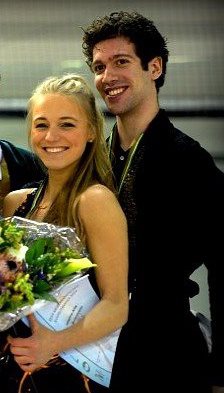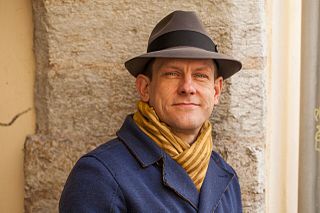
Teet Kask is an Estonian choreographer.

The Estonian Song Festival is one of the largest choral events in the world, a Masterpiece of the Oral and Intangible Heritage of Humanity. It is held every five years in July on the Tallinn Song Festival Grounds (Lauluväljak) simultaneously with the Estonian Dance Festival. The joint choir has comprised more than 30,000 singers performing to an audience of 80,000.

The Estonian Figure Skating Championships are a figure skating national championship held annually to determine the national champions of Estonia. Medals may be awarded in the disciplines of men's singles, women's singles, pair skating, and ice dancing on the senior, junior, and novice levels.

Maian-Anna Kärmas is an Estonian singer, songwriter, and journalist.
The 2010 Estonian Figure Skating Championships took place between 19 and 20 December 2009 in Tallinn. Skaters competed in the disciplines of men's singles, ladies' singles, pair skating, and ice dancing on the senior and junior levels. The results were used to choose the teams to the 2010 World Championships and the 2010 European Championships.
The 2011 Estonian Figure Skating Championships took place between 17 and 19 December 2010 in Narva. Skaters competed in the disciplines of men's singles, ladies' singles, and ice dancing on the senior and junior levels. The results were used to choose the teams to the 2011 World Championships and the 2011 European Championships.

Taavi Varm is an Estonian artist.
Estonia participated in the Eurovision Song Contest 2015 with the song "Goodbye to Yesterday" written by Stig Rästa. The song was performed by Elina Born and Stig Rästa. The Estonian broadcaster Eesti Rahvusringhääling (ERR) organised the national final Eesti Laul 2015 in order to select the Estonian entry for the 2015 contest in Vienna, Austria. The national final consisted of three shows: two semi-finals and a final. Ten songs competed in each semi-final and the top five from each semi-final as determined by a jury panel and public vote qualified to the final. In the final, the winner was selected over two rounds of voting. In the first round, a jury panel and a public vote selected the top three to qualify to the superfinal. In the superfinal, "Goodbye to Yesterday" performed by Elina Born and Stig Rästa was selected as the winner entirely by a public vote.

Uku Suviste is an Estonian singer-songwriter, pianist and music producer. He was scheduled to represent Estonia in the Eurovision Song Contest 2020 in Rotterdam, Netherlands, before cancellation of the competition that year. Instead, he represented Estonia in the Eurovision Song Contest 2021.
Estonia participated in the Eurovision Song Contest 2016 with the song "Play" written by Fred Krieger, Stig Rästa and Vallo Kikas. The song was performed by Jüri Pootsmann. The Estonian broadcaster Eesti Rahvusringhääling (ERR) organised the national final Eesti Laul 2016 in order to select the Estonian entry for the 2016 contest in Stockholm, Sweden. The national final consisted of three shows: two semi-finals and a final. Ten songs competed in each semi-final and the top five from each semi-final as determined by a jury panel and public vote qualified to the final. In the final, the winner was selected over two rounds of voting. In the first round, a jury panel and a public vote selected the top three to qualify to the superfinal. In the superfinal, "Play" performed by Jüri Pootsmann was selected as the winner entirely by a public vote.

Jan Uuspõld is an Estonian stage, television, radio and film actor and musician.
Laine Mesikäpp was an Estonian film, radio and stage actress, singer, and prolific collector and cataloguer of Estonian folk music.
Estonia participated in the Eurovision Song Contest 2018 with the song "La forza" written by Mihkel Mattisen, Timo Vendt, Ksenia Kuchukova and Elina Nechayeva. The song was performed by Elina Nechayeva. The Estonian broadcaster Eesti Rahvusringhääling (ERR) organised the national final Eesti Laul 2018 in order to select the Estonian entry for the 2018 contest in Lisbon, Portugal. The national final consisted of three shows: two semi-finals and a final. Ten songs competed in each semi-final and five from each semi-final as determined by a jury panel and public vote qualified to the final. In the final, the winner was selected over two rounds of voting. In the first round, a jury panel and a public vote selected the top three to qualify to the superfinal. In the superfinal, "La forza" performed by Elina Nechayeva was selected as the winner entirely by a public vote.

Estonia first participated at the European Youth Olympic Festival in 1993 and has earned medals at both summer and winter festivals.

Estonia competed at the 2018 Summer Youth Olympics, in Buenos Aires, Argentina from 6 October to 18 October 2018.
Estonia originally planned to participate in the Eurovision Song Contest 2020 with the song "What Love Is" written by Uku Suviste and Sharon Vaughn. The song was performed by Uku Suviste. The Estonian broadcaster Eesti Rahvusringhääling (ERR) organised the national final Eesti Laul 2020 in order to select the Estonian entry for the 2020 contest in Rotterdam, Netherlands. The national final consisted of three shows: two semi-finals and a final. Twelve songs competed in each semi-final and six from each semi-final as determined by a jury panel and public vote qualified to the final. In the final, the winner was selected over two rounds of voting. In the first round, a jury panel and a public vote selected the top three to qualify to the superfinal. In the superfinal, "What Love Is" performed by Uku Suviste was selected as the winner entirely by a public vote.
The Estonian Youth Song and Dance Festival is an Estonian youth festival which takes place in Tallinn, Estonia. The festival is a mini-variant of the Estonian Song Festival and the Estonian Dance Festival. The festival is organized by the Estonian Song and Dance Celebration Foundation.
Ei ole üksi ükski maa is an Estonian patriotic song, which was created in 1987 by Alo Mattiisen. The lyrics were created by Jüri Leesment. The song was created in order to support movement against phoshorite mining in Virumaa.
Piret Krumm is an Estonian actress, singer, and comedian whose career began in the early 2010s. She has performed as a stage, television, film and voice actress, as well as a jury panelist for the Eesti Laul competition. She is a singer for the Tallinn-based band Diskofon.
Estonia participated in the Eurovision Song Contest 2022 in Turin, Italy, with "Hope" performed by Stefan. The Estonian broadcaster Eesti Rahvusringhääling (ERR) organised the national final Eesti Laul2022 in order to select the Estonian entry for the contest. The national final consisted of seven shows: four quarter-finals, two semi-finals and a final. Ten songs competed in each quarter-final and semi-final and five from each show as determined by a jury panel and public vote qualified to the final. In the final, the winner was selected over two rounds of voting. In the first round, a jury panel and a public vote selected the top three to qualify to the superfinal. In the superfinal, "Hope" performed by Stefan was selected as the winner entirely by a public vote.












